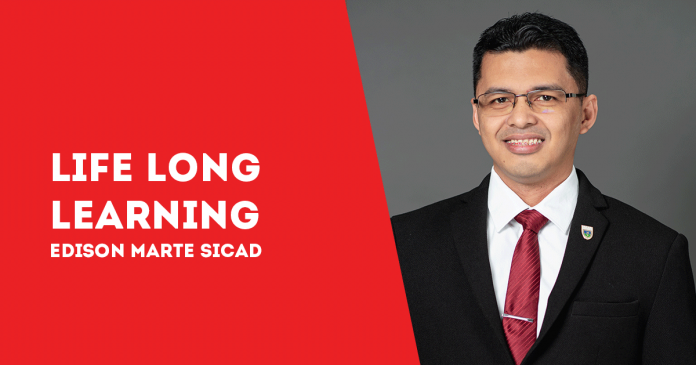
BY EDISON MARTE SICAD
“Success is going from failure to failure without losing our enthusiasm.”
FAMOUSLY attributed to Winston Churchill, there is more to this quote than meets the eye. And the more I read or hear it from others, the more I ponder about the nature of failure.
Some things to ponder:
1. What we say to ourselves is more important than what others say to us.
To what extent do we need to listen and follow the advice of others? How often should we ask for help? Living is such a balancing act that failure—or failing again and again—becomes part of the success cycle. Upon reflecting, we find that both success and failure reside in us. Upon looking ahead, we see that success and failure meet in the horizon.
2. Do not seek for happiness; seek for meaning.
Another controversial advice that can go both ways. For despite the promise of progress, we often arrive at the crossroads that makes our journey not only about moving forward but also choosing which way to go that may lead us only into frustrations.
If only a Map to Happiness can be given to us. In context, the Holy Week shows us another way of looking at life: that a cross carried becomes the way to happiness. Suffering becomes a redeeming act: with the word “passion” having both a human and spiritual attribute.
3. Tolerance or vigilance
There is a thin line between acknowledging vulnerability and tolerating weakness. The former is understandable—human as we are—and thus guidance becomes necessary. The latter is detestable—human as we are—for we can get trapped in a rationale of self-pity and become self-entitled derelict.
This dilemma abounds in a school setting. Teachers—who were given the unenviable task of mentoring students—have to tiptoe between corporal punishment and character building.
4. You are all winners.
This is such an outlandish affirmation. It could be true in some respects but in the context of competitions, there is—as expected—a winner and a loser. The intention may be of good cheer, but the reality is that there has to be losers.
Saying that everyone are winners defeats the purpose of having a competition and an insult to the judges as well. It also waters down the effort of the “true” winners. Further, saying that everyone are really winners makes it more painful to the losers because they were just made confused as to their definition and identity of how can they still be winners contrary to the result of a competition.
5. Where did the fear of students of failing come from? Did they inherit it from parents? Did the teachers teach it? Did the school system nurture it?
If failing is part of learning, and learning is predominantly done in school, how did we arrive at the predicament of students getting depressed because of mistakes in learning?
Who gave them that fear? To make matters worse, the fear of failing is somehow connected to another behavior: the laziness in studying. This has nothing to do with failing or passing per se. It is just that the students do not mind learning at all.
IN CONCLUSION, the nature of failure is a man-made environment. And almost attributed to the grown-ups. Children do not yet have a concrete concept of failure; maybe because they are still too young—and innocent—to be made accountable for their mistakes.
This goes hand in hand with the concept of “sin”. Our ability to identify and rectify our mistakes has a spiritual significance: a sacramental act that gives a message of hope and renewal.
Light clarifies the things around us and creates shadows as well. Only in darkness can we avoid or get rid of our shadows: a pyrrhic victory. And today’s hyperrealistic environment can distort the value of virtues and belittle the capacity of an individual to deal with the realities of life. And blame Life for it—where others are tempted to end it as an escape to freedom.
Some of us can no longer deal with silence. Our thoughts become our own noise. A discord is now required. For it has become a burden talking and listening to our own selves.
Maybe our tendency to talk to ourselves is already an invitation that we can also talk to God: where in the silence of our hearts we get to recalibrate our lives. To have faith. To trust the process. To appreciate the journey and not just the destination.
And when our journey approaches the crossroads, may the words of Robert Frost be of guide to us:
I shall be telling this with a sigh
Somewhere ages and ages hence:
Two roads diverged in a wood, and I—
I took the one less traveled by,
And that has made all the difference./PN



